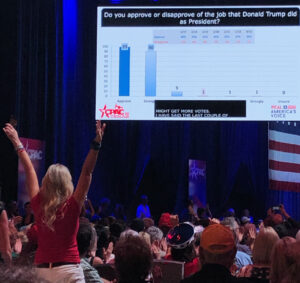
CPAC audience during Donald Trump’s speech, August 6, 2022. Photo by John Griswold
Donald Trump’s keynote speech at the end of CPAC (the Conservative Political Action Conference) in Dallas last Saturday ended with a scripted, dystopian litany of all he says is wrong with America under a Democratic administration, to include:
Inflation, the stock market, energy costs, the Green New Deal, Afghanistan “surrender,” Russia in Ukraine now and China in Taiwan next, weaponized law enforcement, lack of a free press (whom he pointed to in the press pit and called “enemy of the people”), lack of free speech, “rampant” crime, a “collapsing” economy, COVID deaths, Iran as nuclear power and China as military rival, “disaster” airports and canceled flights.
“And perhaps most importantly, we are a nation that is no longer respected or listened to around the world. We are a nation that in many ways has become a joke. We are a nation that is hostile to liberty, freedom and faith. We are a nation that allows men to play sports on women’s teams and to dominate them. […]
“We are in many ways, a third world nation. We are a nation whose economy is floundering, whose supply chain is broken, whose stores are not stocked, whose deliveries are not coming and whose educational system is ranked at the bottom of every single list.”
It was the sort of speech he has used for years, including at his inaugural, in which he broke all conventions for the occasion and bore down on “American carnage.”
But, he said, the MAGA movement, which would “get out country back,” would prevail in the midterm elections this year and in the presidential election in 2024.
“This is the greatest movement in the history of our country,” he said.
“Probably you could say it’s the greatest or one of the greatest in the history of the world. And it’s interesting, because sometimes I’ll make a comment and I’ll be challenged so strongly by the fake news, but they never even challenged me on that. I’ve never been challenged.”
Trump is, of course, synonymous with MAGA, but he has been coy about running again in 2024. At the same time, he wields control over the new Republican party and its candidates for office, who vie for his endorsement.
A straw poll was conducted at the conference, with its admittedly concentrated voting pool, and Trump came out on top.
“I want to thank you for your incredible support also,” he said, “because I just walked in the door, and they told me I had this straw poll. Now I’d just come in: ‘Sir, you won the straw poll.’ [In his stories he often describes people calling him “sir.”]
“I said, ‘I better damn win that straw poll.’ […] And I guess we had 69% [for who would win the Republican primary; Ron DeSantis came in second at 24%; third was Ted Cruz at only 2%] and 99% approval [of the job he did as president].
“Why couldn’t I get 100? Why 99?” he joked, not joking.
At the end of his speech, Trump walked out to Sam & Dave’s “Hold On, I’m Comin’,” a dramatic promise implied but left unstated.
Many on the left hope he will be made ineligible to run again, if only for reasons to do with whatever happened in the FBI seizure at Mar-a-Lago this week. But as president he made mostly inconsequential two impeachments, multiple lawsuits, and demands for tax returns, and so far he has ducked any serious blows to his reputation with his followers in the findings of the Select Committee to Investigate the January 6th Attack on the United States Capitol.
A much different Republican president dealing with a house divided once said, “[W]ith public sentiment, nothing can fail; without it, nothing can succeed.”
